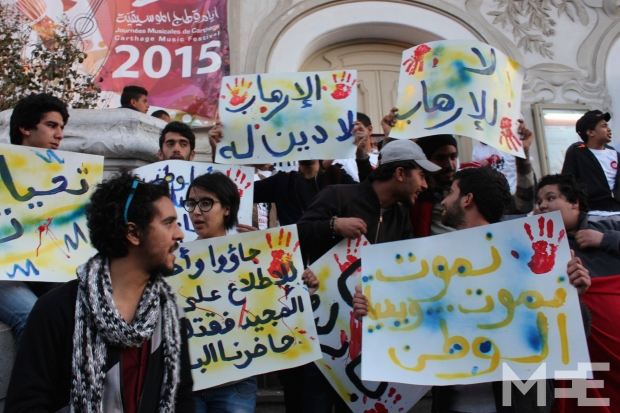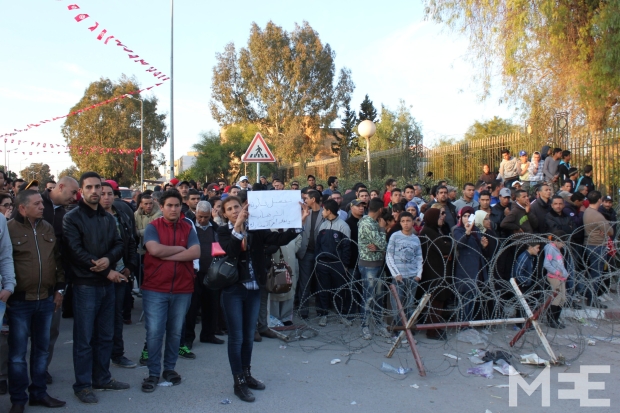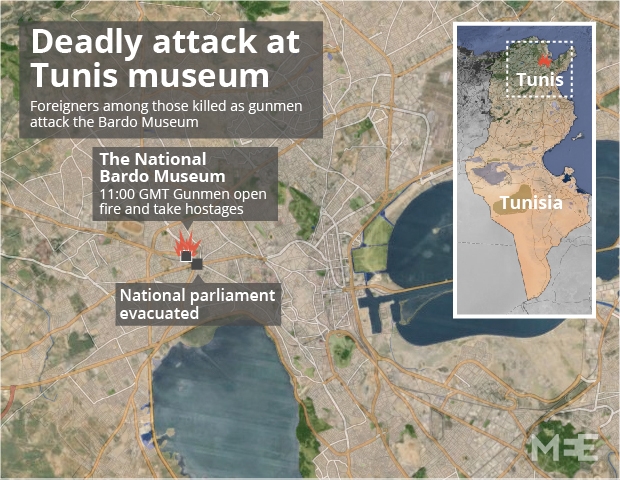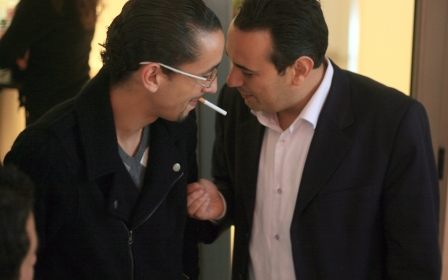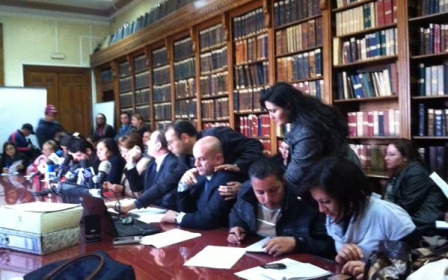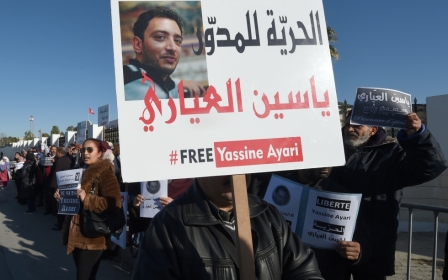At least 17 tourists, 2 Tunisians killed in museum stand-off
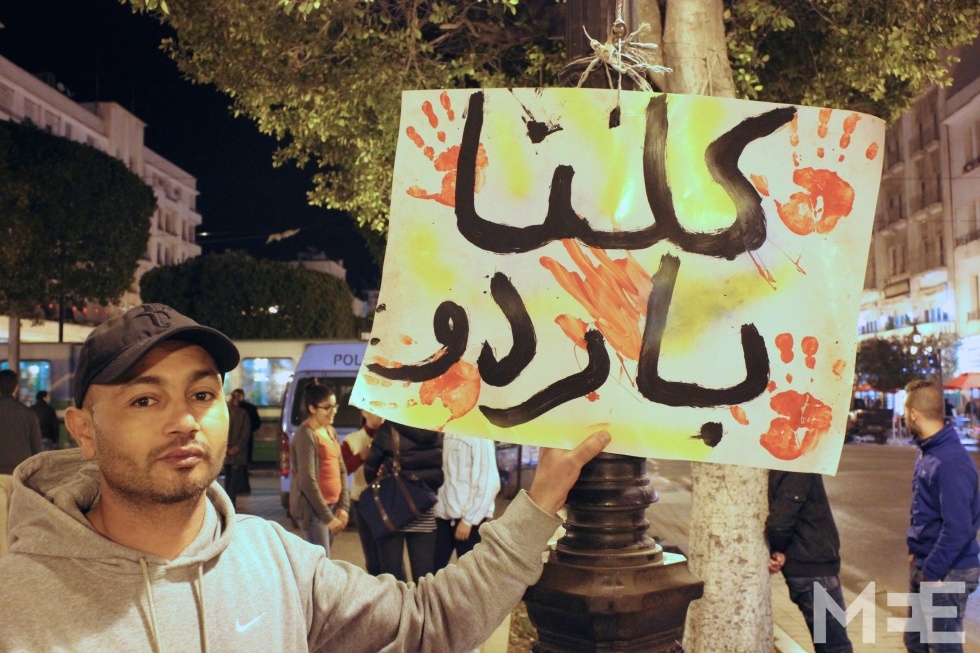
TUNIS - At least 17 foreigners and two Tunisians were killed Wednesday when gunmen carried out a brazen daytime attack on a famed museum next to parliament in Tunis.
The attack also left more than 40 people wounded.
President Beij Caid Essebsi vowed Tunisia would fight those who committed the attack "to our last breath".
"I want the Tunisian people to understand that we are in a war against terrorism and that these savage minorities do not frighten us," said Essebsi, who visited some of the dozens being treated for wounds in a Tunis hospital.
"We will fight them without mercy to our last breath."
Earlier, Prime Minister Habib Essid gave a televised address on Wednesday night confirming the deaths of 17 tourists including four Italians, five Japanese people and two Colombians as well as nationals of France, Poland, Australia and Spain.
Estimated death tolls were higher in the aftermath of the attack, which saw two gunmen and a policeman also killed when police and Special Forces stormed the museum building.
More details later emerged regarding the those that were killed in the attack.
The two Columbians killed were a mother and child enjoying a family holiday, Columbia's foreign ministry in Bogota said.
The father of the family survived, it said, giving no more details.
"We lament the death of 2 Colombians in Tunis and offer condolences to their family," President Juan Manuel Santos said on Twitter.
Colombia "voices its full commitment to respect for human rights. As such, it underscores Colombia's flat rejection of acts of terror and violence," the foreign ministry added.
In Poland, the speaker of the lower house, Radoslaw Sikorski, said "very likely seven Polish people were killed". The country's foreign ministry only confirmed 11 injured.
Additionally, a Japanese survivor described how she and her mother were shot in the hail of bullets.
"I was crouching down with my arms over my head, but I was shot in the ear, hand and neck," 35-year-old Noriko Yuki said from her hospital bed in comments aired by Japanese broadcaster NHK.
"My mother beside me was shot in the neck. Mother couldn't move by herself when the police came over," she added.
Initial reports had indicated that seven or eight tourists and one Tunisian had been killed, but this number soared to 17 tourists and at least one Tunisian once the building was stormed.
It is unclear at this stage whether the additional victims were killed prior to or during the police raid.
Local media reported that around 200 people had been in the museum vicinity at the time. The Italian Foreign Ministry confirmed that 100 of its nationals had managed to flee the scene, with an as yet unconfirmed number of tourists and Tunisians having been taken hostage.
The Tunisian Prime Minister vowed there would be a tough response to the attack.
“We will act relentlessly without mercy towards those violating Tunisia,” Essid told media.
President Beji Caid Essebsi also told AFP that: "The authorities have taken all measures to ensure that such things don't happen" again.
"This is a huge calamity; we must all be deployed in order to displace these terrorists once and for all," he said.
A security source said on Wednesday night that authorities had identified the two deceased gunmen, both Tunisian nationals, according to local news site al-Chorouk.
The men were identified as Hatem al-Khashnawy, from the western city of Kasserine, and Yasin al-Abidi, a resident of the capital.
Khashnawy's father told the site that his son had disappeared three months ago, but had since made contact with the family using an Iraqi mobile phone number.
Authorities are also seeking to question three other men who are believed to have been directly involved in the attack.
Tunisians demonstrate against terror
Crowds gathered outside the museum after it was stormed by police, and cheered the security services as they left the building, despite the heavy casualty toll, reported Eric Reidy for Middle East Eye.
Many gathered outside the municipal theatre after the attack, in a demonstration called for by the Ennahda movement.
Participants sang the Tunisian national anthem and shouted "Tunisia is free - terrorism out".
There was no immediate claim of responsibility for the attack. While the museum is located close to the Tunisian parliament, which had to be evacuated after the initial shots were heard, it is so far believed that the museum was the intended target.
European Union foreign policy chief Federica Mogherini blames Islamic State (IS) for the attack, saying that the “Daesh terrorist organisation is once again targeting the countries and peoples of the Mediterranean region".
"This strengthens our determination to cooperate more closely with our partners to confront the terrorist threat," she said.
However, analysts have questioned Mogherini's assertion, saying that Tunisia faces a broad range of threats and that the attack could have been carried out by local militant groups and was not necessarily the work of IS.
Several militant groups have emerged in Tunisia since the 2011 uprising that toppled former strongman Zine El Abidine Ben Ali, including Ansar al-Sharia, listed as a terrorist organisation by the United States.
Audio released on Tuesday has since emerged, in which a prominent member of al-Qaeda in the Islamic Maghreb (AQIM), Wanas al-Faqih, calls for attacks against Tunisia. However, the group has not made any official statement claiming responsibility.
AQIM have previously claimed responsibility for an attack near the Algerian border that killed four Tunisian security officials in late February.
Authorities estimate that 3,000 Tunisians have also joined militant groups in Iraq and Syria, including the IS group, in which Tunisians are believed to make up the largest group of foreign fighters.
Some of these militants are believed to have returned home, increasing government fears of an attack on Tunisian soil.
As the dust began to settle after Wednesday's attack, Tunisia's Foreign Minister said that the stability of neighbouring Libya was essential to securing the region as a whole.
"These acts of terror aim to disrupt stability and the economy in Tunisia," al-Tayyib al-Bakoush told the press.
"We are striving towards [achieving] stability in Libya in order to guarantee the safety and stability of the region".
Libya, which shares a 450-kilometre border with Tunisia, has been racked by instability for months as opposing parties have sought to fill a power vacuum left by the 2011 toppling of strongman leader Muammar Gaddafi.
Economic repercussions
Despite the security repercussions, economic concerns seem to have been at the top of peoples’ minds in the wake of the attack.
Essid was quick to urge Tunisians to remain "united," after the attack which he stressed was “aimed at destroying the Tunisian economy".
MEE contributor Reidy said many of the hundreds of people who gathered around the museum after the attack ended feared that the incident would harm the nation's fiscal hopes. In particular, the country is striving to rebuild its once-burgeoning tourism industry, hit hard by the 2011 revolution and the subsequent rise in regional insecurity.
Tourism is a key pillar of the economy in Tunisia, which attracted an estimated 6.1 million foreign visitors in 2014 despite visitor numbers falling three percent from 2013.
Reactions
Ennahda's leader, Rashid Ghannoushi, condemned the "terrorist" attack in a statement, promising it would not break the "unity" of Tunisia.
He demanded a "national congress" to discuss a comprehensive anti-terror strategy, as well as the swift issuing of a new anti-terror law.
UN Secretary General Ban Ki-moon condemned what he called the "deplorable" attack.
Ban "condemns in the strongest terms today’s attack" against the Bardo museum and "conveys his deepest condolences to the families of the victims of this deplorable act," said his deputy spokesperson Farhan Haq.
French Prime Minister Manuel Valls was one of the first international leaders to condemn the attack.
"I condemn this terrorist attack in the strongest terms. There has been a hostage-taking, without doubt tourists have been affected, killed," Valls said in Brussels after talks with European Commission President Jean-Claude Juncker.
"This attack cruelly illustrates the threat that we are all confronted with within Europe, in the Mediterranean, around the world. France, Tunisia and Europe will act together to fight terrorism," Valls added.
France has taken a strong stance on terror-related issues since January's deadly Paris attacks, which targeted the Charlie Hebdo satirical magazine and a kosher supermarket and also included the gunning down of a policewoman.
Amnesty International issued a statement condening the attack, which it said showed "utter disregard for life".
“This deadly attack, which in itself is utterly deplorable, must not be allowed to derail what many regard as the region’s most successful transition from authoritarianism to the rule of law and respect for human rights,” said Hassiba Hadj Sahraoui, Deputy Middle East and North Africa Programme Director at Amnesty International.
The Bardo museum, renowned for its exceptional collection of ancient mosaics, is a significant draw for tourists, and opened a new wing in 2012 following a major facelift.
It boasts objects from prehistory, the Phoenician period and Punic and Numidian times, as well as Roman, Christian and Islamic artefacts.
Its curator had described it as "the flagship of (Tunisia's) heritage".
Housed in a former palace dating from the 19th century, the museum greeted hundreds of thousands of visitors every year before the revolution. In 2011 the number dropped to about 100,000 but had been recovering prior to Wednesday's attack.
Middle East Eye propose une couverture et une analyse indépendantes et incomparables du Moyen-Orient, de l’Afrique du Nord et d’autres régions du monde. Pour en savoir plus sur la reprise de ce contenu et les frais qui s’appliquent, veuillez remplir ce formulaire [en anglais]. Pour en savoir plus sur MEE, cliquez ici [en anglais].


